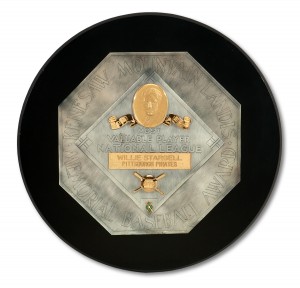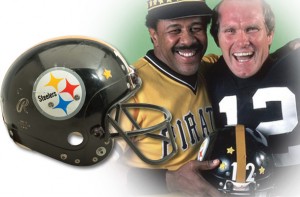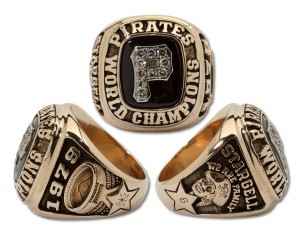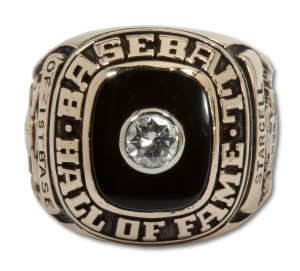THE WILLIE STARGELL COLLECTION
Wilver Dornell “Willie” Stargell was a born leader on the baseball diamond. The late Hall of Fame first baseman, who stood 6’ 2” tall, was affectionately called “Pops” by teammates and fans alike, led by example with both his booming bat and steady glove. He launched a total of 475 home runs and drove in 1,540 runs during his prolific 21-year MLB career, all with the Pittsburgh Pirates, so his power at the plate was never taken lightly. Besides his thunderous bat, the career .282 batter was a great motivator who began the practice of handing out embroidered “Stargell Stars” in 1978 to his teammates for their caps after making great plays. When it came to encouraging the troops, Stargell was a consummate field general.
“Be honest and work hard to get what you want,” he once said. “Don’t take shortcuts; you only cheat yourself in the long run. Success is not measured by money or fame, but by how you feel about your own goals and accomplishments and the time and effort you put into them.”
A seven-time MLB All-Star, Stargell led Pittsburgh to six NL East titles as well as a pair of National League pennants and World Series championships in 1971 and ’79. In fact, it was during the team’s awe-inspiring run to the latter Fall Classic when the popular song “We Are Family” by Sister Sledge became the team’s unofficial anthem. Stargell was the team’s unquestioned patriarch.
After spending three years in their farm system, he eventually made his MLB debut for the Pirates in 1962 and rotated between the outfield and first base during his first 13 seasons before becoming the team’s permanent first baseman in 1975. From 1964 to ‘70, he averaged 26 homers per season. But it was in 1971 – when the Bucs claimed their fourth World Series title and first in 11 years – when Stargell’s power started grabbing national attention. He belted a career-best 48 round-trippers and knocked in 125 runs that season to finish second in the NL MVP race. Two years later, Stargell recorded a league-best 43 doubles, 44 home runs and knock in 119 runs, but again finished second in the NL MVP balloting.
Despite just missing the league MVP nods, tape measure home runs were becoming his trademark. He could hit them with regularity at home – first at Forbes Field, then at Three Rivers Stadium – or on the road. At one point, in fact, he held the record for the longest home runs hit in nearly half of the National League ballparks. Take, for example, his power at the plate at Dodger Stadium. On August 5, 1969, Stargell hit a home run off of Dodgers’ right-hander Alan Foster that left the stadium and measured 507 feet, the longest home run ever hit at Chavez Ravine. He hit a second home run out of Dodger Stadium on May 8, 1973, against Andy Messersmith, that measured 470 feet. Dodgers’ Hall of Fame starter Don Sutton said of Stargell’s power: “I never saw anything like it. He doesn’t just hit pitchers, he takes away their dignity.” Even Cincinnati Reds’ Manager Sparky Anderson once remarked: “He’s got power enough to hit home runs in any park, including Yellowstone.”
Stargell’s persistence and consistency would eventually land him the coveted league MVP honor in 1979 when, at the age of 39, Pops was finally recognized for his outstanding efforts. Besides leading his team to another pennant and its fifth World Series title, he recorded 119 hits, 82 RBI, 32 home runs and batted .282. It was his postseason heroics, however, that inked his place in the Hall of Fame. He batted .455 and belted two tape-measure shots against Cincinnati to help the Pirates sweep the Reds in the ’79 NLCS, before hitting three home runs, including the go-ahead blast in Game 7 against Baltimore, to secure Pittsburgh’s fifth ring. Not only did he win the NL MVP award, but was named MVP of both postseason series, an unprecedented trifecta that has yet to be matched. He retired following the 1982 season and was elected into the Baseball Hall of Fame in 1988, his first year of eligibility.
After his on-field career ended, Stargell remained a part of the game by serving as a coach for the Atlanta Braves. He eventually made it back to the Pirates’ organization where he served in several capacities including that of special baseball advisor to then-Pirates owner Kevin McClatchy. After years of suffering from a kidney disorder, he died of complications related to a stroke in Wilmington, North Carolina, on April 9, 2001. He was 61 years old. He had been in the hospital recovering from a gallbladder surgery at the time of his death. On April 7, 2001, two days before he died, a larger-than-life statue of Stargell was unveiled at the Pirates’ new stadium, PNC Park, as part of the opening-day ceremonies.
His well-deserved plaque in Cooperstown reads in part as follows: “Intimidating presence between the lines and charismatic patriarch in clubhouse and dugout.” In describing Wilver Dornell Stargell, that pretty much sums it up.




